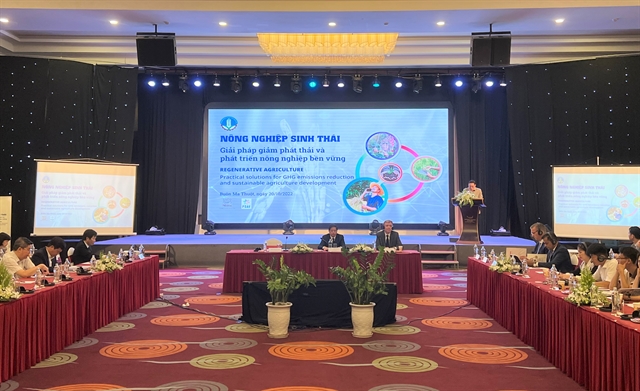 Society
Society


|
| A conference on how regenerative agriculture can help achieve sustainable agriculture development was held in Đắk Lắk Province on October 20. – VNS Photo Việt Dũng |
ĐẮK LẮK – Regenerative agriculture and other farming practices that can reduce environmental damage and ultilise waste effectively are important to Việt Nam’s commitment of net-zero emissions by 2050, according to a conference in Đắk Lắk Province on October 20.
Lê Quốc Doanh, deputy minister of Agriculture and Rural Development, said that the country’s agriculture industry had made great economic and food safety achievements over the past few years.
“However, agricultural production is a source of emissions, especially activities related to cultivation, animal husbandry, land management, fertilization and others,” he said, adding that a sizable proportion of CO2 emissions come from cultivation activities.
"Việt Nam needs to focus more on investing and transforming production models from pursuing output growth by consuming more resources into environmentally friendly models that can deal with climate change," he said.
Trần Đại Nghĩa, a member of an expert group aiding the COP26 implementation taskforce, said that Việt Nam aimed to reduce greenhouse gas emissions while still ensuring sustainable economic growth in an effort to reach its net zero emission target by 2050.
By 2030, Việt Nam aimed to reduce methane emission from areas such as cultivation, animal husbandry and coal mining by at least 30 per cent below the 2020 level, he said.
The action plan for the above target included helping farmers adopt farming practices that are more economically efficient and environmentally friendly, ceasing the practice of burning agricultural waste and by-products by developing processes for collecting, treating, recycling and repurposing them, as well as developing biogas models and technologies for producing organic fertilisers from animal husbandry waste.
Relevant authorities were working on an action plan for the Glasgow Leaders’ Declaration on Forests and Land Use, which targets reversing deforestation and forest land degradation, monitoring forest conversion, and perfecting policies for sustainable production without deforestation.
Việt Nam was also striving towards transitioning into sustainable food and agriculture practices by encouraging the effective usage of resources, avoiding environmental damage, and protecting air and water from pollution, all while ensuring better livelihoods for farmers, he said.
David Rennie, head of Nestlé Coffee Brands, said that dealing with climate change required a multitude of national and international actors, public and private, to work together.
Nestlé Group had been focusing on regenerative agriculture, which is “a holistic model that aims to improve soil health and fertility, as well as protect water resources and biodiversity.”
It had great potential to help address climate change and reduce greenhouse gas emissions as it would contribute to drawing down carbon dioxide from the atmosphere and into the soil, he said.
The company’s Nescafé Plan 2030 involved working with coffee farmers to help them transition to regenerative coffee farming practices, he added.
Võ Văn Cảnh, deputy chairman of Đắk Lắk Province People’s Committee, said that the province was among the top provinces in terms of agricultural land, leading to high fertiliser usage.
Some local farmers had been utilising agriculture waste and by-products such as sugarcane bagasse and coffee husks to make organic fertilisers as part of their pursuit of regenerative agriculture.
However, regenerative agriculture was not widely adopted yet, so the province was focusing on orienting local agriculture production towards protecting land, water and the environment, and the application of modern technology to use natural resources more effectively, he said.
The conference was held by the Ministry of Agriculture and Rural Development, Đắk Lắk People's Committee, and Nestlé Vietnam. – VNS




